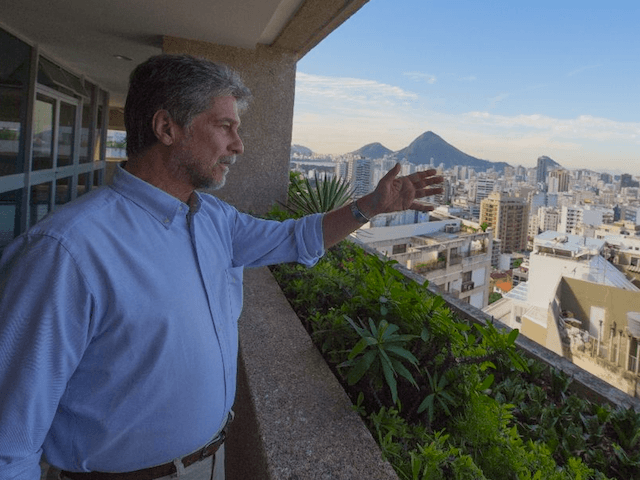Rio de Janeiro (AFP) – He surfs, dances in carnivals and can sound more revolutionary than royal, but Prince Dom Joao de Orleans e Braganca is serious about restoring the monarchy to save Brazil.
As Latin America’s biggest country sinks under a tsunami of corruption, recession and political instability, Dom Joao told AFP that the royals — who were last in charge 126 years ago — could be part of a “radical” solution.
The prince, great-great-grandson of the tragic final monarch, Emperor Pedro II, said Brazil should switch from a republic to a constitutional monarchy, along the lines of Britain or Sweden, where Queen Elizabeth II and King Carl XVI Gustaf are essentially figureheads.
With a greying, trimmed beard, a neatly buttoned shirt, tan slacks and boat shoes worn without socks, the 62-year-old real estate developer and keen photographer said there would be no need for ornate palaces and long titles.
Brazil’s modern emperor would be modeled on the modest, so-called bicycle monarchs of Scandinavia, he said — even if as a lifelong beach lover, he’d more likely be dubbed the surfer king.
“There’s an idea that the monarchy is pompous and I don’t disagree, but if you look at the modern ones, especially the Scandinavians, they are very simple heads of state,” he said at his apartment building in Rio’s swanky Leblon neighborhood.
Dom Joao claims that royals would mean the return of an almost extinct type of public figure in today’s Brazil, where president Dilma Rousseff is in the throes of impeachment proceedings over her alleged fiddling of the national budget, while Congress is reeling from corruption scandals.
“As royals, the one difference is that we have been raised to have… a sense of serving the country without wanting anything back,” Dom Joao said.
– Game of thrones –
Although most Brazilians would agree the political system isn’t working, few are serious about putting the imperial family back in business. The last time Brazilians held a referendum on restoration, in 1993, only 10 percent voted yes.
And there’s another problem: the royals can’t agree who would wear the crown.
The last to occupy the throne, Emperor Pedro II, was deposed on November 15, 1889 in a military takeover, followed by the declaration of a republic. A progressive monarch whose reign saw the abolition of slavery and Brazil’s rise as a regional power, Pedro II went into exile in Europe where he is said to have lived with little money, dying two years later.
Since then, the royal family has sunk into obscurity and internal division.
One branch living in Sao Paulo is headed by presumptive heir Dom Luiz, 77, while many consider the politically active third eldest in the family, Dom Bertrand, to be the real emperor in waiting.
An austere and deeply religious 75-year-old, Dom Bertrand is linked to the conservative Tradition, Family and Property organization.
In public appearances, he rails at communists and what he calls the “eco-terrorists” fighting to preserve the Amazon rainforest from Brazil’s powerful agricultural industry.
Dom Joao, from the more liberal Petropolis-based branch, near Rio de Janeiro, seems embarrassed by his right wing cousins. “It’s awful, awful,” he murmured.
According to Dom Joao, Dom Bertrand’s affiliation to political organizations rules him out from claiming the throne.
As for his own impediment — a decision a century ago by his grandfather to renounce his rights and those of his descendants — “there is a big group of jurists who say that abdication had no legal standing.”
“If you want to ask ‘Who’s the heir?’ Well, there is no heir,” Dom Joao said firmly.
It would be up to the new parliament — replacing today’s discredited Congress — to decide.
– People’s prince? –
Despite the referendum failure, Brazilians could be persuaded to think again, said Nilton Ferreira, a member of the Brazilian Monarchy Circle, which promotes a return to royal rule.
“The idea of monarchy is very attractive to people — not the idea of ostentation but because they recall the example set during the time of Emperor Pedro II,” he said.
And the man to steer Brazil’s return to that golden age would be Dom Joao rather than the Sao Paulo princes, Ferreira, 40, reckons.
“Dom Joao is young and much closer to the people and he understands the Brazilian dynamics far better.”
To be sure, Dom Joao is not your average Brazilian. But he is keen to show a popular touch.
He plays tambourine in the annual Rio carnival and while people often address him as “Your excellency,” he said that Dom Joao will do. “Or just Joao if you prefer.”
A frequent traveler, he has friendly ties with Brazil’s indigenous peoples. His Facebook page features him sitting with tribesmen, his face streaked in ceremonial paint.
More controversially, Dom Joao is a strong supporter of impeaching Rousseff. He joined the huge street demonstrations against the leftist president over the last year.
Rousseff, a former Marxist guerrilla who was tortured under Brazil’s military dictatorship in the 1970s, claims she is the victim of a right-wing coup masked as an impeachment.
Critics also say that protesters, while numerous, were overwhelmingly middle and upper class whites, with little participation by the more black and poor parts of Brazil’s multi-ethnic population.
But Dom Joao sees the peaceful rallies as proof of Brazilians’ determination to topple today’s corrupted elite.
“If we don’t go on the streets, if we don’t have a big fight to change what’s going on, we’ll get nothing,” he said.
That thirst for change means that although a restoration of the monarchy sounds far-fetched, Dom Joao can at least dream.
And if all else fails, he can always grab his surfboard.
“The beach, that’s where everyone meets — and there are no social classes,” he said.

COMMENTS
Please let us know if you're having issues with commenting.